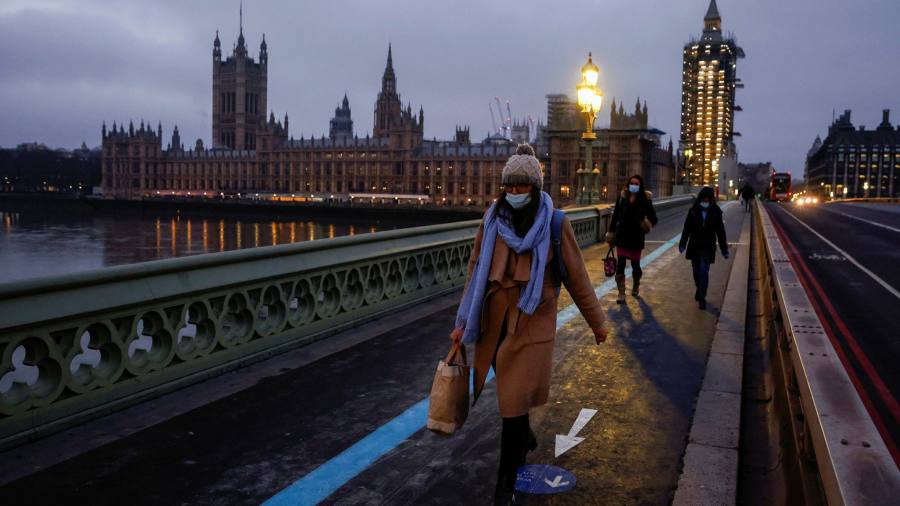
The darkest hour of the pandemic has yet to come
Those who predicted that 2021 would be different from 2020 are proven correct – but not in the way anyone would want them to. Although there are several activities Covid-19 Vaccines, the United Kingdom, several European countries, the United States and Brazil appear to be heading to Darkest moments In the epidemic.
The number of people who have tested positive in the UK now Exceeds routinely 50,000 a day. Infections are increasing in London, eastern England and the southeast. It is also stabilizing in other areas where rates have been declining. This is despite the closure of universities and schools due to seasonal holidays. Full reopening has been postponed.
The number of people in hospital infected with Covid-19 is already higher than the April peak. Sir Jeremy Farrar, Director of the Wellcome Trust and A. Epidemic ConsultantTell me we’ve passed the point where the NHS is in danger of crashing; The parts are really warping. Health care workers, the same key workers being called to roll out vaccines, are overwhelmed. Many are isolated or sick. The current classification system does not maintain infection rates.
The situation is so dangerous that a National lockdownSchools, including school closures, appear necessary. “What we have now is two or three months of something that will feel and emerge is being “Worse than March and April,” Sir Jeremy says, adding that schools may have to close until February due to the spread of the new species among young people, which threatens to turn schools into more important sources of infection. He confirmed that he was speaking in his personal capacity.
The truth is that there is a rampant spread, fueled in the UK by a combination of a new variant more transmissible around 50-70 percent, plus restrictions lifted at the beginning of December when R number It was hovering around 1.
The lockdown will starve the virus from the human contact it feeds on and provide breathing space: to accelerate the spread of vaccines and beat the virus; To have a suitable test system up and running in schools, so that they can confidently reopen them with a decrease in the R number; Ministers must show honesty and humility about the formidable challenges that lie ahead. The The promise of vaccines It should not be an indicator of complacency, but rather a catalyst to reduce transmission, so that the virus has fewer chances of mutating before people are vaccinated.
This race between immunization and the mutation has never been more urgent – a fact recognized in the UK’s realistic decision to delay booster vaccines until more people can be given the first dose. The highly susceptible variant, even if not more severe than its predecessors, is very worrisome. Calculating the infection means that more infections, as with the B.1.1.7 strain currently prevalent in the UK, inevitably translates into more deaths (despite improvements in treatments and patient care). In addition to the personal tragedies that come with an increase in infections, unrestricted transmission risks creating more variants that could avoid current vaccines. Brazil, India and Mexico are hot spots worth seeing.
According to the World Health Organization, an even more alarming variable was first reported from South Africa in at least four other countries, including the United Kingdom. This strain, known as 501Y.V2, has already shown some resistance to monoclonal antibodies, and is a potentially promising treatment. A new variant could appear anywhere and spread everywhere, making the race to conquer the Coronavirus globally unpatriotic.
If 2020 teaches us anything, it is that states can never act early and that delaying the inevitable leads to long-term suffering. Imperial College London Modern analyzing He indicates that the lockdown one week earlier in the first spring wave would have reduced deaths in the UK from around 37,000 to around 16,000.
Taiwan, Vietnam, and New Zealand demonstrate that aggressive early intervention provides healthy populations who are able to participate in a healthy economy. Walking a middle path between public health and the economy, as the UK has tried to do since March, is half a measure that does not protect either. It’s like trying to keep the highway open after a pile of rubble and hoping drivers can veer to avoid debris, rather than blocking the road and cleaning it so traffic flows naturally. More collisions simply produce more debris and injuries.
Ultimately, the road will have to be closed anyway and cleaning will take longer. This has been the pattern with UK lockdowns in 2020. Only if we act more quickly is there a chance 2021 will be different.
The writer is a scholarly commentator

“Analist. Schepper. Zombiefanaat. Fervente reisjunkie. Popcultuurexpert. Alcoholfan.”
